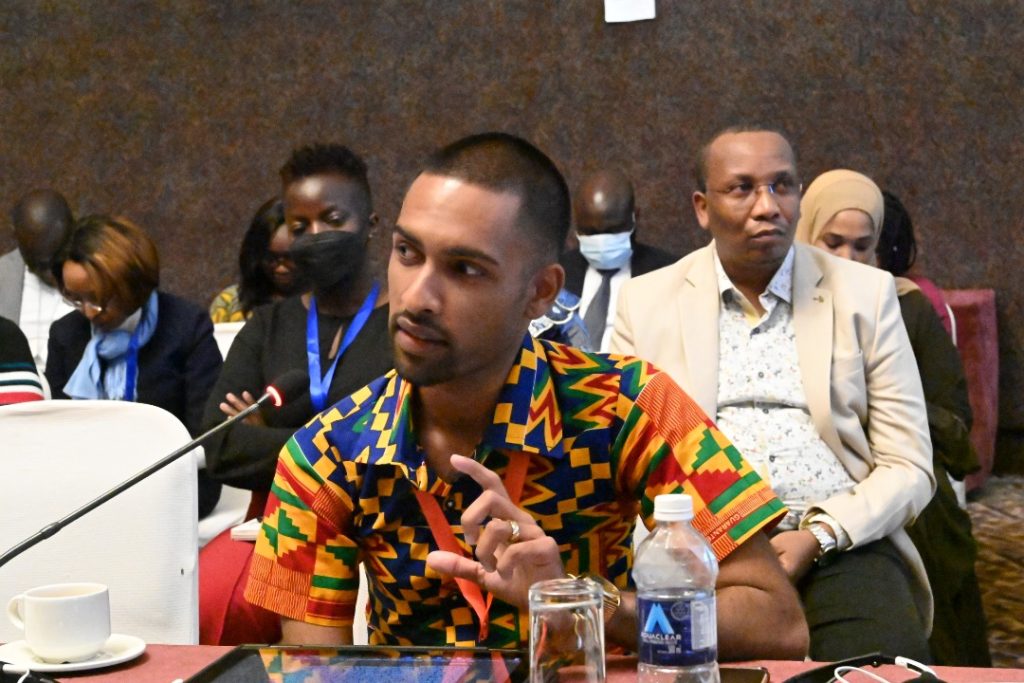
Harare, Friday, July, 29, 2022: Youth delegates attending the 2nd High Level Ministerial Conference on youth, peace and security have presented a six-point shared vision for their agenda to Ministers in charge of youth affairs in the southern African region. The six points focus on strengthening the continental, regional and national frameworks for youth inclusion in decision-making relating to peace and securitOutcomes Document- Our Shared Vision for the Youth Agenda in Peace and Securityy.
The vision statement was the outcome of four days deliberation that took place in Harare on 25 – 28 July 2022. It was attended by community youth leaders from countries in the eastern, southern and the Horn of Africa, the National Youth Councils, the AU Youth Envoy, African Youth Ambassador for Peace for Southern Africa and Youth Ambassadors of the Common Market for Eastern and Southern Africa (COMESA).
Zimbabwe President H.E. Emmerson Mnangagwa, represented by the Minister of Foreign Affairs and International Trade Hon. Frederick Shava opened the ministerial session on Thursday, 28 July 2022. The thrust of the conference was on the role of governments, Regional Economic Communities (RECs), and Regional Mechanisms (RMs) in promoting the youth, peace, and security agenda in the southern Africa region.
In their outcome statement the youth called for strengthening of the following: the implementation of AU continental framework on youth peace and security; engagement with decision-makers; National Youth Councils and youth organizations, research and development; technological advancement and Youth, Peace and Security (YPS) agenda monitoring and evaluation.
“We call for urgent action by governments to address the challenges through the establishment and strengthening early warning and response systems at national, regional, and continental levels,” said the youth in the statement presented by the Chairperson of the COMESA Youth Advisory Panel, Ms. Angel Mbuthia.
They stressed the need for mainstreaming youth into national peace infrastructures, advancing the use of various technological platforms for YPS, encouraging the use of alternative dispute resolution mechanisms and the prioritization of civic and peace education for the youth which may be embedded in national education curriculum.
Ministers and their representatives from Botswana, Comoros, D R Congo, Eswatini, Lesotho, Madagascar, Malawi, Mauritius, Mozambique, Namibia, Seychelles, South Africa, Zambia and Zimbabwe attended the conference.
In his statement, President Mnangagwa appreciated the conference objectives noting that they put young people at the centre of peace and security in the region.
“It is their rightful place. Through this conference, Africa and our region in particular affirms and commits to the role that our youth must play now in key and most pressing issues of our times,”
The president noted that most of the countries in the Southern African region have been relatively peaceful and stable, with infrequent armed insurgencies, and some forms of protracted conflict.
“These conflicts have negatively impacted the lives of people, especially our young people who make up more than 60% of the Southern Africa population,” said the President. “It is now time that our collective voices become loud; indeed, if anything, louder than the guns across our motherland Africa. Let our voices silence the guns.”
Responding to the issues raised by the youth, the Ministers and their representatives from the 14 southern African countries outlined their governments’ initiatives and undertook to promote youth inclusion and empowerment.
The conference was jointly organized by the African Union and COMESA in partnership with the African Centre for Constructive Resolution of Disputes (ACCORD), Save the Children Horn of Africa Youth Network, the Institute for Security Studies (ISS) and the Southern Africa Partnership for Prevention of Conflict (SAPPC).
Outcome document: Shared vision for youth peace and security agenda.

